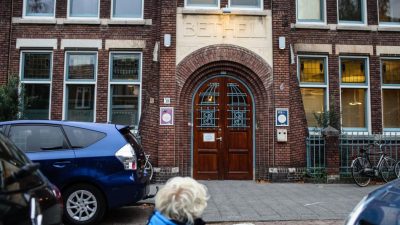A Dutch church has been conducting religious services for 27 days to protect a refugee family

By law, police officers in The Netherlands are not allowed to enter places of worship during religious services. So, reverends from around the country have taken turns holding services at Bethel Church to prevent officials from arresting the Tamrazyan family, who have been in The Netherlands for nine years. “By giving hospitality to this family, we could give them time and place to [demonstrate] to the secretary of state the … urgency of their situation,” Theo Hettema, chairman of the General Council of Protestant Ministers says.
Sasun and Anousche Tamrazyan and their three children, Hayarpi, Warduhi, and Seyran, fled their native Armenia and sought asylum in The Netherlands after Sasun’s political activism earned them death threats. After several years of court procedures, the family was granted asylum by a judge, but the government launched legal proceedings and succeeded in overturning that ruling. (While Hettema does not know why the government sought to reverse the Tamrazyans’ asylum status, he believes appealing asylum approvals may be part of the government’s strategy to limit immigration.)
The family then applied for a “children’s pardon,” a policy that allows refugee families with children who have resided in The Netherlands for more than five years to get a permit to stay. Their application was denied, which isn’t unusual: The Dutch government has only granted 100 of 1,360 applications for a child’s pardon since May 2013.
The Tamrazyans had been living in an asylum shelter in the municipality of Katwijk for two years when they found out about the deportation order. They decided to seek shelter at a nearby church, but it was too small to house the family, so they reached out to other Protestant congregations in The Hague to ask for help. On Oct. 25, Bethel Church (link in Dutch) answered their call. The Tamrazyan family has been there ever since.
The request to take in the Tamrazyans put the leadership of the church in an uncomfortable position because, as Hettema explains, no church should have to choose between respect for human dignity and respect for government. But in the end, he told his church community that he decided to welcome the family in order to stay true to “the openness and hospitality of the church.” Hettema says that the church doesn’t plan on ending the religious service any time soon, but he is hopeful the Minister of Migration, Mark Harbers, will use his “discretionary” powers to grant residency to the Tamrazyans, as he has done in the past for certain cases.
The Dutch have come under fire in recent years for their harsh asylum laws. The rise in power of far-right parties has brought anti-immigration rhetoric into the mainstream and created a tense climate for many refugees. But this month, the Tamrazyans saw a different side of the country, with hundreds of people visiting Bethel Church to show their support. Hettema says more than 300 Dutch reverends have volunteered to lead services at Bethel, and a petition calling on the Dutch government to grant more children’s pardons to refugee families has garnered close to a quarter of a million signatures. As Hayarpi Tamrazyan told Dutch newspaper Trouw (link in Dutch), “It’s impossible to express how special it feels when so many people help you.” (Quartz)

